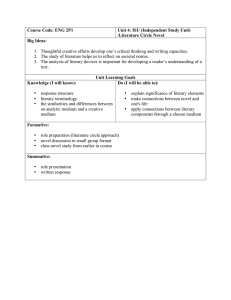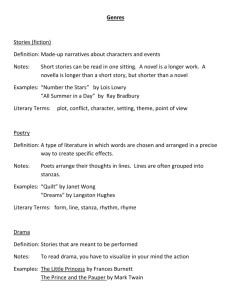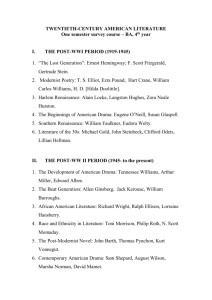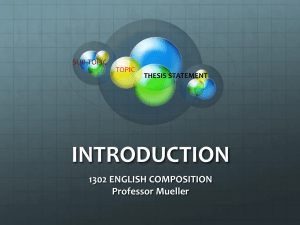ENGLISH ENLT 201
advertisement
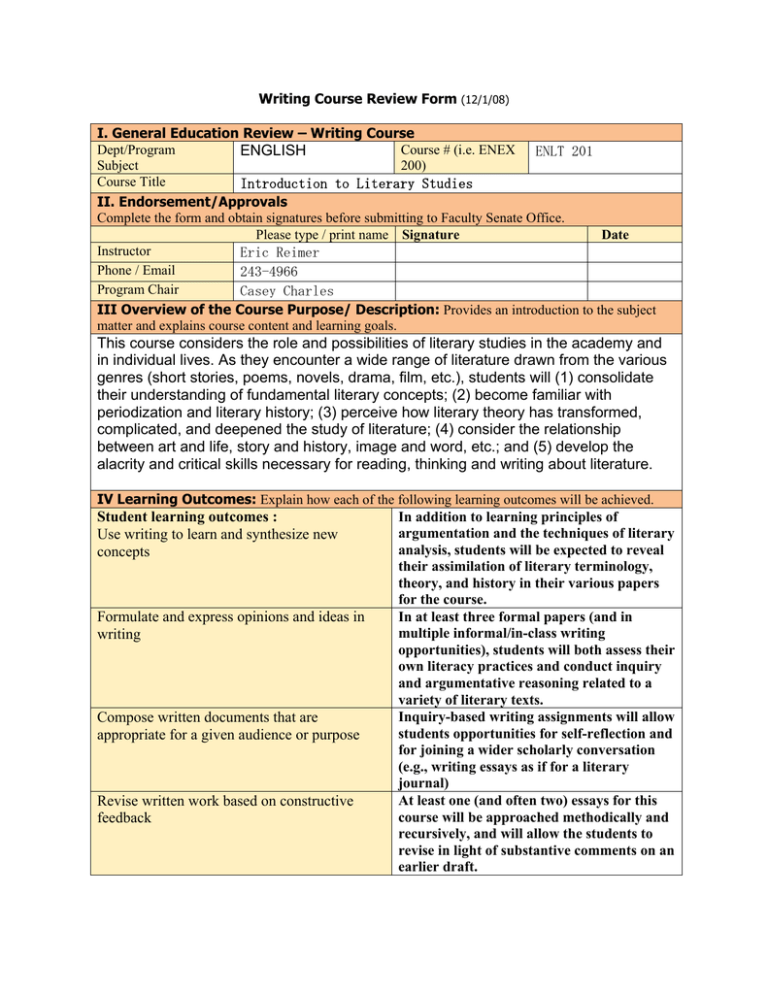
Writing Course Review Form (12/1/08) I. General Education Review – Writing Course Dept/Program Course # (i.e. ENEX ENLT 201 ENGLISH Subject 200) Course Title Introduction to Literary Studies II. Endorsement/Approvals Complete the form and obtain signatures before submitting to Faculty Senate Office. Please type / print name Signature Date Instructor Eric Reimer Phone / Email 243-4966 Program Chair Casey Charles III Overview of the Course Purpose/ Description: Provides an introduction to the subject matter and explains course content and learning goals. This course considers the role and possibilities of literary studies in the academy and in individual lives. As they encounter a wide range of literature drawn from the various genres (short stories, poems, novels, drama, film, etc.), students will (1) consolidate their understanding of fundamental literary concepts; (2) become familiar with periodization and literary history; (3) perceive how literary theory has transformed, complicated, and deepened the study of literature; (4) consider the relationship between art and life, story and history, image and word, etc.; and (5) develop the alacrity and critical skills necessary for reading, thinking and writing about literature. IV Learning Outcomes: Explain how each of the following learning outcomes will be achieved. In addition to learning principles of Student learning outcomes : argumentation and the techniques of literary Use writing to learn and synthesize new analysis, students will be expected to reveal concepts their assimilation of literary terminology, theory, and history in their various papers for the course. In at least three formal papers (and in Formulate and express opinions and ideas in multiple informal/in-class writing writing opportunities), students will both assess their own literacy practices and conduct inquiry and argumentative reasoning related to a variety of literary texts. Inquiry-based writing assignments will allow Compose written documents that are students opportunities for self-reflection and appropriate for a given audience or purpose for joining a wider scholarly conversation (e.g., writing essays as if for a literary journal) At least one (and often two) essays for this Revise written work based on constructive course will be approached methodically and feedback recursively, and will allow the students to revise in light of substantive comments on an earlier draft. Find, evaluate, and use information effectively 200-level courses in the English department (see http://www.lib.umt.edu/informationliteracy/) share some common outcomes; the information literacy outcome, developed with Sue Samson, is: *Students will support their literary research with access to academic information resources provided by the library and will include both in-text citations and a bibliography of sources that adheres to the MLA style of documentation. 200-level courses in the English department Begin to use discipline-specific writing share some common outcomes; those conventions relevant to the writing course designation are: *Students will be able to perform a literary close reading, demonstrating an ability insightfully to interpret primary literary texts by thoughtfully integrating quoted passages into the larger argumentative claims of an essay. *Students will be able to write rhetorically effective papers (wellreasoned and grammatically consistent), driven by a thesis and sustained by an ordered, coherent argument or sequence of ideas. Writing workshops, examples, and Demonstrate appropriate English language substantial instructor feedback on formal usage papers will foreground issues related to prose style, language usage, and grammar. V. Writing Course Requirements Check list Is enrollment capped at 25 students? If not, list maximum course enrollment. Explain how outcomes will be adequately met for this number of students. Justify the request for variance. Yes No The English Department is hoping to keep this important entry point to the major capped at 20 students, though it may at times, depending on student demand, reach an enrollment of 25. Are outcomes listed in the course syllabus? If not, how will students be informed of course expectations? Yes No Yes, this class now has an agreed-upon outcomes statement that appears on (or otherwise accompanies) the syllabus. Yes No Yes, Information Literacy requirements are included in the outcomes statement, and are subsequently supplemented through collaborative work between the library staff and the students. Yes No Are expectations for Information Literacy listed in the course syllabus? If not, how will students be informed of course expectations? Are detailed requirements for all written assignments included in the course syllabus? If not how and when will students be informed of written assignments? Basic requirements for the various formal written assignments are included in the course syllabus, and more extended and nuanced articulations are provided subsequently in specific assignment handouts and in writing workshops that help students prepare for the particularities of a given writing assignment. What instructional methods will be used to teach Students will read and discuss literary students to write for specific audiences, purposes, scholarship at the level of rhetorical methods and genres? and strategies, and will then complete modest and discrete exercises (e.g., crafting a thesis/enthymeme, writing an opening paragraph, incorporating source material into their prose both purposefully and economically, etc.) in advance of writing their longer and more comprehensive assignments and essays. Will written assignments include an opportunity for Yes No revision? If not, then explain how students will Yes. As in virtually any literature course but receive and use feedback to improve their writing especially in this one, students receive ability. extended and exacting comments, and will be able to consider and respond to this feedback as they revise one (and sometimes two) of their formal papers. VI. Writing Assignments: Please describe course assignments. Students should be required to individually compose at least 16 pages of writing for assessment. At least 50% of the course grade should be based on students’ performance on writing assignments. Clear expression, quality, and accuracy of content are considered an integral part of the grade on any writing assignment. Formal Graded Assignments Depending on the instructor, this course requires two to four short papers of 3-4 pp. each, and one final paper of 6-8 pp., and often an assortment of specialized writing assignments (e.g., short annotated bibliographies, opening paragraph exercises, rhetorical analyses of scholarly essays, conference abstracts, etc.). Some instructors will also require short essays on quizzes and/or a final exam. Writing as an ongoing process is emphasized at all times, and revision figures prominently in the methodology and in the expectations for at least one of the major papers. Informal Ungraded Assignments There are inevitably multiple occasions (at least a half-dozen, depending on the instructor) for informal ungraded assignments, many of them occurring as accompaniments to in-class exercises and reading responses. VII. Syllabus: Paste syllabus below or attach and send digital copy with form. ⇓ The syllabus should clearly describe how the above criteria are satisfied. For assistance on syllabus preparation see: http://teaching.berkeley.edu/bgd/syllabus.html Paste syllabus here. INTRODUCTION TO LITERARY STUDIES ENLT 201 ** M W F 10:10 – 11:00 ** LA 105 ABOUT THE COURSE : In attending to some big questions – e.g., what is literature? Why do/should we read and study literature? How do/should we read and study literature? What literature should we study? – this course will find you considering the role and possibilities of literary studies in the academy and in your own lives. As you encounter a wide range of literature drawn from the various genres (short stories, poems, novels, drama, film, etc.), you will (1) consolidate your understanding of fundamental literary concepts; (2) become familiar with periodization and literary history; (3) perceive how literary theory has transformed, complicated, and deepened the study of literature; (4) consider the relationship between art and life, story and history, image and word, etc.; and (5) develop the alacrity and critical skills necessary for reading, thinking and writing about literature. Most importantly, perhaps, our inquiry and discussions will help us realize things that “in all their different ways,” as Mary Gordon has written, “point to something we find difficult to name and yet know as our treasure.” COURSE OUTCOMES : • • • • • • Students will understand the major characteristics of the dominant genres (poetry, fiction, and drama) and utilize those characteristics to analyze individual examples. Students will be able to state clearly the central themes, concepts, and ideas governing a work of literature and then, as a separate but related act, to evaluate their literary importance and/or cultural significance. Students will be able to engage thoughtfully with a range of perspectives on controversial issues, including an ability to state clearly the assumptions and premises of their own position. Students will be able to perform a literary close reading, demonstrating an ability to insightfully interpret primary literary texts by thoughtfully integrating quoted passages into the larger argumentative claims of an essay. Students will be able to write clear, grammatically consistent, and rhetorically effective papers, driven by a thesis and sustained by an ordered, coherent argument or sequence of ideas. Students will be introduced to the major historical, creative, and theoretical areas of study in the English major, as well as becoming familiar with the professors of the Department and their specialties. • Students will support their literary research with access to academic information resources provided by the library and will include both in-text citations and a bibliography of sources that adheres to the MLA style of documentation. REQUIRED TEXTS : * Rob Pope, The English Studies Book (2002) * Brian Friel, Dancing at Lughnasa (1990) * Toni Morrison, Jazz (1992) * Michael Ondaatje, The English Patient (1993) * Salman Rushdie, Haroun and the Sea of Stories (1990) * Selected poems and essays on E-Reserves at Mansfield Library REQUIREMENTS : Collaborative presentation Annotated bibliography (8 sources) Quiz (concepts, theories, and literary history) Four response papers (2 pp. each) One extended analytical paper (7-8 pp., with abstract) Class participation 10% 15% 15% 20% 20% 20% The response papers will be based on prompts/directives that I supply; they will include at least one rhetorical analysis of a piece of literary scholarship, and will give you the opportunity to engage and write about various genres (i.e., poetry, short/long fiction, drama, film, etc.). Unless otherwise noted, papers must be typed and double-spaced, with 1” margins; to avoid grade reductions you will be expected to meet the minimum page requirements, attend to the assignment criteria, and turn them on time. Late papers will be marked down one-half letter grade per day (weekends count as one day). Your class participation grade will be calculated based on your attendance, on various short writings (both in-class and assigned), on your contributions to our discussions, and generally on your willingness to engage the texts attentively and critically on a class-to-class basis. The course will conclude with a multi-day practicum surrounding Salman Rushdie’s novel Haroun and the Sea of Stories, which will be the result of independent work that you and a partner complete throughout the semester. In other words, this will be a collaborative venture: working in pairs, you should read the book throughout the semester, research the book/author/historical contexts, etc., obtain critical material via the library and/or Interlibrary Loan, meet as a group to discuss your progress, and ultimately decide what critical approaches you can use to discuss the novel. After submitting an abstract that distills and introduces your project, you and your partner will form a panel and present your work to the class. On each day, three or four panels will present for roughly ten minutes each, with the remaining time allotted for questions and discussion. The final analytical paper will be derived from a line-of-inquiry of your choosing and will focus on one (or more) of our class texts. This thesis-driven investigation will also necessarily be in conversation with multiple secondary sources, and will ultimately emerge from your own research, in-class writing workshops, and a revision process. ACADEMIC HONESTY : All work that you submit for this course must be your own, and it must be written exclusively for this course. The unacknowledged borrowing of others’ words or ideas – whether from books, the internet or other sources – constitutes the serious academic crime of plagiarism; if you fail to document those sources consulted for your writing, you risk an automatic failure for the entire course. If you have any doubts or questions about the plagiarism or the University’s academic honesty policy, please see me. SPECIAL NEEDS : If you have a documented disability or otherwise anticipate needing special accommodations in this course, please bring this to my attention as early in the semester as possible so that we have an understanding and can make the arrangements that will allow for your full participation in the course. NOTA BENE : The English Department may utilize, for assessment purposes, any work students produce in this class, including exam material as well as formal essays. No departmental assessment of student work will have any impact on a student’s grade in the course or progress in the major. Throughout the assessment process, all summary data will be aggregated and student work will remain anonymous, with all characteristics identifying individual students removed before the material is read by anybody but the course instructor. Students who do not wish to have their work used by the Department for assessment may opt out by notifying the instructor in writing before the first assignment is completed. TENTATIVE SCHEDULE : 1/21 No Class : Martin Luther King Day. 1/23 Introduction. The canon. 1/25 Responding to fiction. Read: “Hills Like White Elephants” (Hemingway, handout). 1/28 Liberal Humanism. Formalism. New Criticism. Reader Response theory. Read: The English Studies Book (ESB), 1‐12, 29‐43, 73‐95. 1/30 Active reading. The short story. Read: “The String Quartet” (Woolf, handout) and “The Woman in the Garden” (Birkerts) (ER). 2/1 Poetry. Read: “On the Death of Dr. Robert Levet” (Johnson) (ER), “Poetry and the Constellation of Surprise” (Hirshfield) (ER), and ESB 250‐254. 2/4 Poetry, cont’d. 2Read: “Sonnet #29” (Shakespeare), “Composed Upon Westminster Bridge” (Wordsworth), 2/6 Poetry, cont’d. Read: “Valediction: Forbidding Mourning” (Donne) and “The Pulley” (Herbert) (ER). 2/8 Poetry, cont’d. Read: “Ozymandias” and “Hymn to Intellectual Beauty” (Shelley) (ER). 2/11 Writing Workshop. DUE: Response paper #1. 2/13 Poetry, cont’d. Read: “The Weary Blues” and “Summer Night” (Hughes) (ER). 2/15 Poetry, cont’d. Read: excerpt from The Prelude (Wordsworth) and “The Love Song of J. Alfred Prufrock” (Eliot) (ER). 2/18 No Class: Washington‐Lincoln Day. 2/20 Psychoanalytic and Feminist theory. New Historicism. Read: ESB 96‐105, 114‐126. DUE: Response paper #2. 2/22 The novel. Read: The English Patient (3‐65). 2/25 The novel, cont’d. Read: The English Patient (69‐130). 2/27 TBA. 2/29 The novel, cont’d. Read: The English Patient (133‐203). 3/3 The novel, cont’d. Read: The English Patient (207‐302). 3/5 Writing Workshop. DUE: Annotated bibliography. 3/7 Music, literature, identity. Read: “Jewels Brought from Bondage: Black Music and the Politics of Identity” (Gilroy) (ER). 3/10 The novel, cont’d. Read Jazz (3‐51). 3/12 The novel, cont’d. Read: Jazz (53‐114). 3/14 The novel, cont’d. Read: Jazz (117‐162). 3/17 Music: A Love Supreme (John Coltrane). DUE: Response paper #3. 3/19 The novel, cont’d. Read: Jazz (165‐229). 3/21 Film studies. Postcolonial theory and literature. Read: “The Sea is History” (Walcott) (ER) and ESB 138‐155. 3/24 No Class: Spring Break. 3/26 No Class: Spring Break. 3/28 No Class: Spring Break. 3/31 FILM: Mister Johnson (dir. B. Beresford). 4/2 FILM, cont’d. 4/4 Film discussion. Introduction to drama. DUE: Response paper #4. 4/7 Drama. Read: Dancing at Lughnasa, Act I (Friel). 4/9 Drama, cont’d. Read: Dancing at Lughnasa, Act II (Friel). 4/11 Drama, cont’d. Thesis workshop. 4/14 Essays on reading and literature I. Read: “Mah vah Huh Puh” and “The Death of Literature” (Birkerts) (ER). 4/16 Essays on reading and literature II. Read: “Moral Fiction” (Gordon) (handout). 4/18 QUIZ. 4/21 Postmodernism. Cultural Studies. Read: ESB 127‐137. DUE: Abstracts for Rushdie practicum. 4/23 Writing workshop. 4/25 Rushdie practicum. 4/28 Rushdie practicum, cont’d. 4/30 Rushdie practicum, cont’d. 5/2 Conclusions. Evaluations. DUE: Analytical paper. and“The Sightseers” (Muldoon) (ER).

